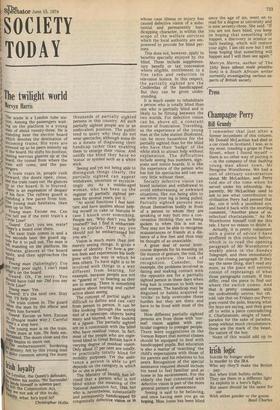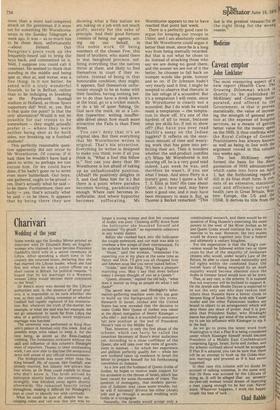'Press
Champagne Perry
Bill Grandy
I remember that just after a former incumbent of this column, Mr Donald McLachlan had died in a car crash in Scotland, I was, as is my wont, treading a grape in Fleet Street, when I found myself — there is no other way of putting it — in the company of that dashing young man about town, Mr Peregrine Worsthorne. We had a sort of obituary conversation about Mr McLachlan, and Perry told me of the time when he served under his editorship. Apparently, Mr McLachlan used to ask to see what contribution to civilisation Perry had penned that day, con it with a jaundiced eye, and hand it back with the snorting comment, "Another piece of intellectual charlatanism." As Mr Worsthorne himself told me this tale, I have no reason to doubt it.
Actually, it is pretty consonant with a piece of advice I have proffered in this column before, which is to read the opening paragraph of Mr Worsthorne's weekly piece in the Sunday Telegraph, and then immediately read the closing paragraph. If they say the same thing, don't read any more, as the piece will entirely consist of rephrasings of what those paragraphs contain. If they differ, read the piece to find out where the switch comes. And that is pretty consonant with the undoubtedly untrue, but oft told, tale that on Fridays our Perry goes round the pubs, hearing what the boys are saying, and then goes off to write a piece contradicting it. Charlatanism, sleight of hand, paradox for the sake of paradox, pomp without much circumstance, these are the mark of the beast, the nature of the boy.
None of this would add up to •
more than a mere bad-tempered attack on the gentleman if it were not for something Mr Worsthorne wrote in the Sunday Telegraph a week ago. It was — as so much has to be these days, unfortunately
—about . Ireland. Our Peregrine's piece took up the frequently-heard call to bring the boys back, and commented on it. Well, I suppose you could call it comment. He seemed to think that standing in the middle and being spat at, shot at, and worse, was a fine thing. Is it not better, he asked with a truly wonderful flourish, to be in Belfast, rather than to be indulging in breaking up the Feyenoord football stadium in Holland, as those Spurs supporters did? Well, er, yes. But is that quite the point? Is that the only alternative? Would it not be possible for our troops to be somewhere — they might actually prefer it — where they were neither being shot at by both sides, nor breaking up a football stadium?
This perfectly reasonable question apparently did not occur to Mr Worsthorne. Of course, if it had, then he wouldn't have had a piece to write, so perhaps we can excuse him. Or we could have done, if he hadn't gone on to write even more balderdash. Our boys, one gathered, ought to be proud — yes, that's actually what he said — to be there. Furthermore, they are lucky — yes, that's actually what he said — to be there. It appears that by being there they are showing what a fine nation we are, taking on a job with not much profit, merely for the sake of principle. And their good fortune consists of being our agents, act ing on our behalf, in this noble work. Of being members of the chosen Few, this band of brothers, who stand there in that benighted province, suffering everything that the natives throw at them, and likely to find themselves in court if they retaliate. Instead of being in that honourable condition, they might, it appears, find themselves unfortunate enough to be at home with their families, having nothing better to do than have a drink down at the local, go to a cricket match, or do a bit of quiet fishing. Or, God save the mark, sit at a London typewriter, writing insufferable drivel about how much more attractive the Falls is than Fleet Street.
You can't deny that it's an original idea. But then everything that Mr Worsthorne writes is original. That's his attraction. Everything he writes is designed to make you think, even if all you think is, "What a fool this fellow is." Nor can you deny that Mr Worsthorne is not afraid of taking up an unfashionable position. (Afraid? He positively delights in it, and God bless him for it.) But there is a point where paradox becomes boring, paradoxically enough. Where cant becomes insufferable. And where hypocrisy becomes suffocating. Mr Worsthorne appears to me to have reached that point last week.
There is a perfectly good case to argue for keeping our troops in Ulster, and I am absolutely certain that Mr Worsthorne could argue it better than most, since he is a long way from being mentally retarded. But that is not what he chose to do. Instead of attacking those who say we are doing no good there, and the sooner we are out of it the better, he chooses to fall back on trumpet words like pride, honour and so on. If Dr Johnson hadn't very nearly said it first, I might be tempted to observe that rhetoric is the last refuge of a scoundrel. But it's a temptation I will resist, since Mr Worsthorne is clearly not a scoundrel. But I do wish he would resist a temptation — the temptation to show off. It's one of the hardest of all to resist, because what are skills for, if not to show off? (But have you ever read Hazlitt's essay on the Indian jugglers? It reflects on the enormous amount of time and wearying work that has gone into perfecting their act. Then it wonders whether the end-product justifies it?) When Mr Worsthorne is not showing off, he is a very good read indeed. Last week he was, and therefore he wasn't, if you see what I mean. And since Perry is a literary gent, may I quote a bit of T. S. Eliot at him? His case about Ulster, as I have said, may have been a good one, and it may have been necessary to state it. But, as Thomas a Becket remarked: "This
last is the greatest treason/To do the right thing for the wrong reason."



































 Previous page
Previous page